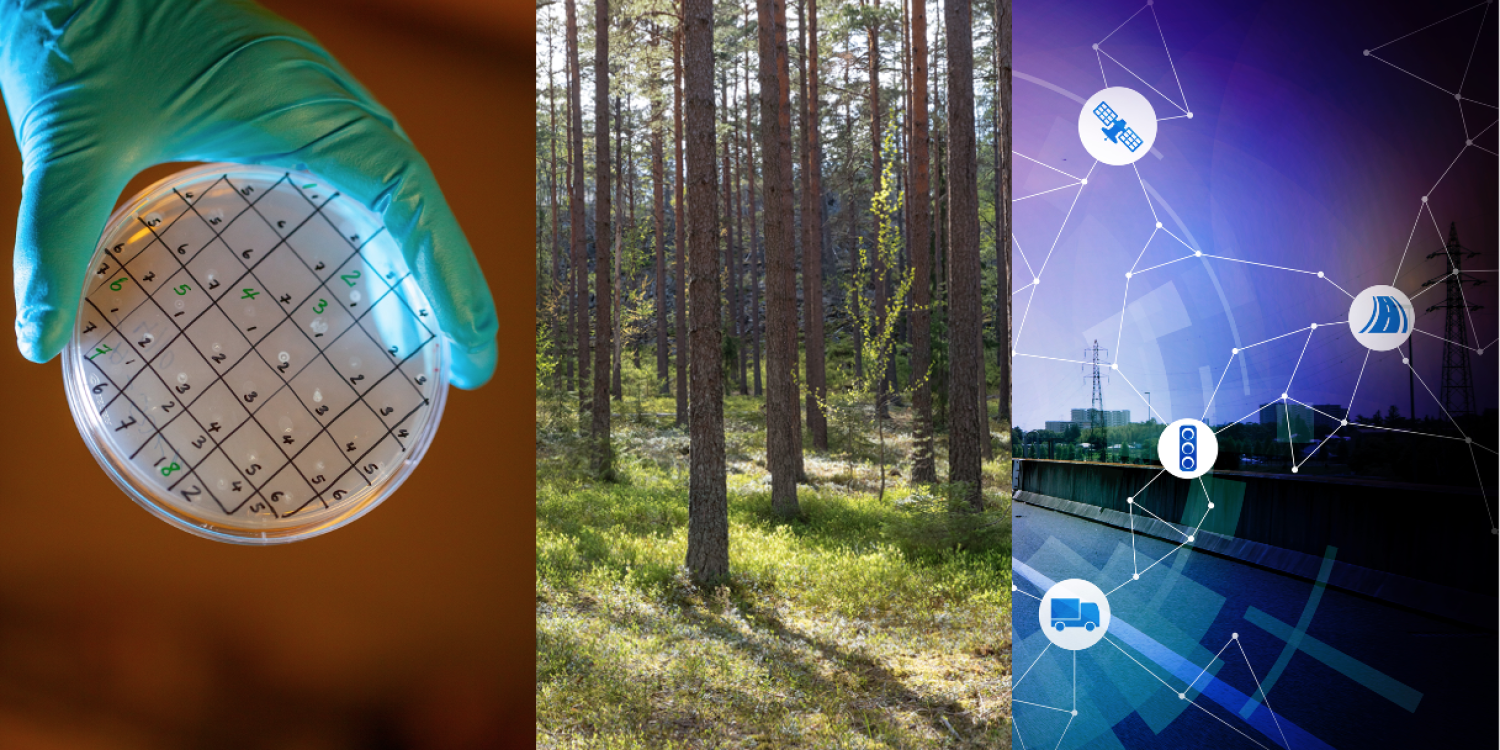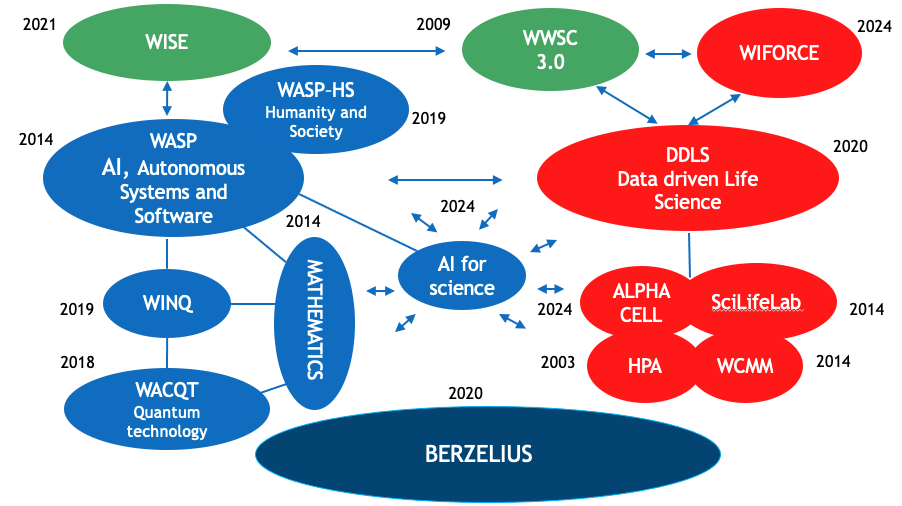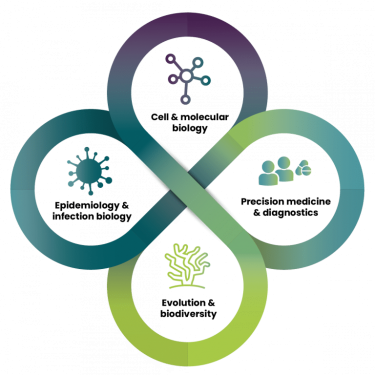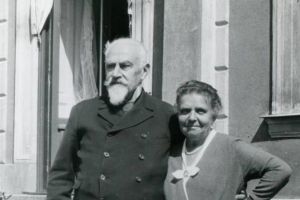Over a period of almost 20 years brick after brick has been added in the creation of three clusters: a life sciences network and a network in mathematics, data, AI and quantum technology, and in sustainable materials science generating reciprocal synergies.
The goal is to ensure that Swedish academic and industrial research is at the forefront of the rapid developments taking place in the fields set to dominate societal development.
A network of competence
Life sciences first
Life sciences is a broad field in which research findings primarily benefit the medical sector in the form of new drugs, diagnostic methods, prevention and therapy. Progress also benefits veterinary medicine, plant research and biotech, along with forestry and the food industry.
The Foundation’s initiative began in 2000, when two consortia were formed in the fields of functional genomics, genomics and bioinformatics: Wallenberg Consortium North (WCN), and Swegene. The Foundation’s investment in these consortia totaled almost SEK 1 billion. Their prime mission was to establish common technical platforms and resource centers for researchers, given that the equipment and other infrastructure required were very expensive. The project also involved the introduction of new approaches and forms of collaboration. This sowed the seeds for what were to become SciLifeLab and Wallenberg Center for Molecular Medicine (WCMM), and the high level of expertise in life sciences existing in Sweden today.
In 2003 Professor Mathias Uhlén began working on the Human Protein Atlas Project (HPA), which is mapping and imaging the 20,000 or so proteins present in the human body. The project has gone on to describe the location of individual proteins in the body. In total, HPA has received funding of over SEK 1 billion from the Foundation. The atlas, which is an open database, developed and become Wallenberg Center for Protein Research (WCPR) at KTH Royal Institute of Technology and Chalmers University of Technology, with the emphasis on biological molecules for medical applications.
The Foundation has over 20 years also invested in forest research via Wallenberg Wood Science Center, Umeå Plant Science Center, SciLifeLab and the program for increased forest production. The research spans a broad spectrum: from production of the world’s first whole-genome sequences for trees, and large-scale mapping of Sweden’s spruce and pine cultivar populations, to development of environmentally-friendly forest cultivation methods and new sustainable materials based on forest raw materials.
"The Foundation’s strategic initiatives during the period include recruitment of 250 new research teams to Sweden and education for about 1,300 PhD students of which one third industrial PhD's, over 600 postdocs and at least 120 industrial postdocs."
The foundation has in total allocated SEK 6.8 billion in life science during the period 2014–2032.
Mathematics, AI and medicine
In 2014 the Foundation and the Royal Swedish Academy of Sciences launched a joint mathematics initiative. Evolving mathematics is a foundation stone for many sciences, not least life sciences, AI and new technology. The Foundation has allocated SEK 650 million for the program to 2030.
The same year the Foundation earmarked SEK 600 million for the Wallenberg Clinical Scholars program with a view to boosting Swedish clinical research, this too in collaboration with the Royal Swedish Academy of Sciences.
2014 also saw the establishment of Wallenberg Centre for Molecular Medicine (WCMM) at the universities of Gothenburg, Lund, Umeå and Linköping, in collaboration with the respective health care regions. AstraZeneca is also involved in Gothenburg. The aim is to create the best conditions for world-leading molecular and traditional research, and foster next generation leaders in the academic world and health care sector. Some 90 experimental and clinical research leaders have been recruited to date. WCMM and SciLifeLab have also launched a joint national program for future research leaders in life sciences. Total funds of SEK 1 billion will be allocated to WCMM to 2028.
In 2014 the Foundation decided to provide substantial funding for SciLifeLab – a national research center for molecular biosciences. Knut and Alice Wallenberg Foundation has contributed approximately SEK 800 million, some of which has gone to build sequencing capacity, facilities for cryo-electron microscopy (cryo-EM) single-cell analysis and bioinformatics. SciLifeLab is also coordinating a number of Foundation initiatives, including its substantial funding of Covid-related research in 2020.
The same year a program was launched in the field of autonomous systems and software, expanded in 2017 to include AI – Wallenberg Artificial Intelligence, Autonomous Systems and Software Program (WASP). The goal is to recruit 100 new research teams, and educate 600 PhD students, where of at least 150 in industry. The idea is to establish an internationally excellent environment for research into autonomous systems, software, and AI. A total of SEK 5.1 billion has been allocated to the program to 2031.
Quantum research to the fore
In 2018 the next piece was added to the mathematics–data–AI network, in the form of Wallenberg Centre for Quantum Technology (WACQT). The object is to establish a long-term high level of expertise in Swedish academia and industry by attempting to build a 100-bit superconducting quantum computer. The Foundation has allocated SEK 1.4 billion to 2029.
The following year Nordita – the Nordic Institute for Theoretical Physics, headed by Frank Wilczek, Nobel laureate in Physics in 2004 and a professor at Stockholm University – was added to the cluster as a complement to WASP and WACQT. Nordita was awarded a grant of SEK 95 million to establish research teams in two new fields: quantum information and complex networks, both relevant to quantum computing, AI and “big data’’. The research program is called The Wallenberg Initiative on Networks and Quantum Information (WINQ).
The same year the WASP program was joined by a sister program: WASP-HS. Researchers in the humanities and social sciences will be examining how development of new technology and AI impact society and human behavior. The program is receiving funding of SEK 720 million over ten years from Marianne and Marcus Wallenberg Foundation and Marcus and Amalia Wallenberg Foundation.
Major boost for complex data processing
Two further major initiatives were seen in 2020 in their respective clusters/networks, yielding synergies for both.
Life sciences, along with other research fields, is becoming increasingly dependent on complex data. Never before has so much data been produced that may result in new, essential knowledge. The quantity of data, and its complexity, is growing exponentially. Partly in response to this trend, the Foundation, in collaboration with SciLifeLab and a WCMM program entitled Data-Driven Life Science (DDLS), has launched an initiative worth over SEK 3.1 billion. The program’s goal is to build up broad expertise throughout Sweden to ensure that the future need for researchers in the field of data-driven life sciences, both in academia and in industry, is met. The research spans areas such as basic research for new drugs, spread of infection and infection biology, precision medicine and diagnostics, evolution and biodiversity, as well as cell and molecular biology.
The overall plan is to recruit 39 top international researchers, establish a graduate school for 260 PhD students/industrial PhD’s, and announce 90 postdoc positions, along with 45 in industry.
The program is building on the Foundation’s earlier life science initiatives, and form a clear contact surface with the expertise established in mathematics, data and AI under the WASP and WACQT programs.
The second initiative, representing an investment of SEK 300 million, was development of Berzelius a supercomputer for AI and machine learning at Linköping University. The researchers who will primarily be working on the supercomputer are involved in the research programs funded by the Foundation. Berzelius was upgraded to double capacity in 2024 with SEK 125 million.
In late 2024 additionally SEK 200 billion was allocated to data-driven life science and, SEK 270 miljon to the Alpha Cell program.
Materials science for a sustainable world
At the end of 2021, the research program Wallenberg Initiative Material Science for Sustainability (WISE) was launched. The aim of the program is to create the conditions for a sustainable society by researching next generation of ecofriendly materials and manufacturing processes. This will also facilitate better technology for energy systems of the future, and to combat pollution and toxic emissions.
The Foundation has allocated SEK 3 billion to the new research initiative during the period 2022 – 2033.
Reducing the environmental and climate footprint of the materials we use in our day-to-day lives and in industry is necessary to achieve the set climate and environmental goals within the UN Agenda 2030 and the Paris Agreement.
The WISE-program focuses on four basic research areas: conversion, storage, and distribution of clean energy; circular materials replacing rare, energy-demanding, and hazardous materials; mitigation, cleaning and protection of atmosphere, soil, and water and discovery of materials for novel sustainable technologies.
Under the program, 25 international research teams will be recruited, and a postgraduate school will be established, offering 180 PhD positions, 30 of them industrial PhD students, along with 180 postdoctoral positions, of which 30 will be industrial postdoctoral positions.
The universities participating in WISE are Uppsala University, Lund University, KTH Royal Institute of Technology, Chalmers University of Technology, Stockholm University, Luleå University of technology and Linköping University, which is also hosting the program.
At the same time the Foundation allocated further funding of SEK 380 million to Wallenberg Wood Science Center (WWSC) for research on renewable materials from derived from the forest under the “New Materials from Trees for a Sustainable Future” program.
Some of the goals include replacing oil with wood in the manufacturing of plastics, creating stronger, fire-resistant materials, as well as new functional materials.
The expansion of the program, which is being conducted at Chalmers, KTH and Linköping University, means that six research leaders, 36 PhD students, and the same number of postdocs can be recruited, along with four visiting professors.
The program expansion brings the Foundation’s total investment in WWSC to SEK 1.2 billion.
Future use and management of Swedish forests
Wallenberg Initiatives in Forest Research (WIFORCE) is the latest strategic initiative launched in 2024. It is a comprehensive basic research program that address complex questions like how to secure long term, sustainable forestry, and biological diversity of the forest in a changing climate. The initiative spans from the diversity within individual species to the diversity of entire forest landscapes. It is a continuation of the earlier Knut and Alice Wallenberg Foundation program on basic forest research in genetics, genomics and biotechnology, as well as forest management of the future.
The program involves five appointments, one for each sub-project: Forest management and biodiversity in terrestrial environments, Forest management and biodiversity in water-rich environments, Tools for structural and functional biodiversity evaluation, Mapping biodiversity using eDNA, Genetic biodiversity in relation to forest management. The program also includes a graduate school, enrolling more than 50 PhD students, of whom 14 will be industry PhDs.
The Foundation has allocated SEK 513 million to the program during the period 2019–2030.
A strategic approach for the benefit of Sweden
The by-laws of the Foundation laid down over a hundred years ago by Knut and Alice Wallenberg stipulate that it should promote scientific research and education conducted for the benefit of Sweden.
Knut and Alice Wallenberg Foundation has made numerous contributions to the process by which Sweden has become a leading life science nation. In total, the Foundation will have allocated just over SEK 6.8 billion to research in life sciences during the period 2014–2032. The Foundation has awarded grants for equipment, national infrastructure, along with project and individual grants, thereby playing a part in developments in this field for more than thirty years.
In the same way, the Foundation is contributing to the establishment and development of Sweden’s expertise in mathematics, data, AI and quantum technology, to the tune of SEK 7 billion between 2015 and 2031.
The Foundation’s initiatives during the period include recruitment of 250 new research teams to Sweden and education for about 1,300 PhD students, over 600 postdocs and at least 120 industrial postdocs.
In addition have several meeting places for academic researchers and industry partners been established, so called industrial research arenas. They are characterized by advanced technical platforms established outside of academia, where scientists and engineers from academia and industry jointly explore, test, upscale and develop scientific theories to shorten knowledge transfer between academia and industry.



